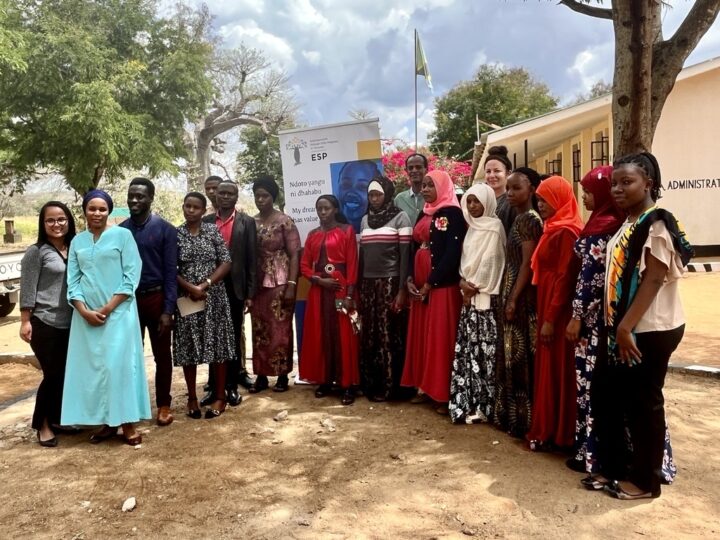International Women’s Day (IWD) recognizes the achievements of women and marks a call to action for accelerating gender parity. Over 100 countries will be celebrating IWD on March 8 with this year’s theme, Embracing Equity.
Niagara College prioritizes supporting gender equity and inclusion worldwide through projects in several countries. These projects support Canada’s Feminist International Assistance Policy (FIAP) and demonstrate NC’s commitment to the United Nations 17 Sustainable Development Goals (SDGs), specifically SDG number 5 – Gender Equality.
14 countries in Africa and Latin America
NC recently completed a project with United Nations Educational, Scientific and Cultural Organization (UNESCO) including 14 countries in Africa and Latin America. The project focused on building Technical and Vocational Education and Training (TVET) institutions to deliver career guidance and support and encourage young women to become engaged in Science, Technology, Engineering and Mathematics (STEM)-related fields.
The Capacity-Building Programme delivered by NC contributed to UNESCO’s Supporting TVET Institutions’ Post-Pandemic Recovery Project. As STEM skills grow in demand, the programme paid particular attention to career guidance services that would support young women and girls in STEM-related TVET and ultimately increase female participation in STEM-related careers.
The programme included an assessment to determine the areas of need in the sector. The analysis identified limited career guidance materials as a gap, so this became a priority to support students throughout their STEM TVET journey. The analysis also showed that female students face several challenges related to gender discrimination and bias, gender inequity, societal influences, harassment, intimidation and sociocultural constraints.
NC also delivered three webinars in October titled, Barriers and Supports for Students Entering STEM TVET, Supporting Students During Their STEM TVET Studies, and Pathways to Employment and the Role of Career Guidance.
The project’s culminating step was a panel session in November involving NC professors who have worked in the industry, a current NC student, an NC alum, and a career guidance coordinator from a Jamaican TVET institute. The aim of the webinars was to allow participants to hear from those involved in STEM TVET on challenges, opportunities and how to encourage women and girls to enter the sector.
NC delivered the programme to two cohorts of participants from TVET institutions in Chile, Colombia, Cuba, Ghana, Grenada, Jamaica, Madagascar, Mexico, Nigeria, Paraguay, Peru, South Africa, Tanzania and Uganda.
Kenya
In Kenya, NC and Sheridan College are working with 26 TVET institutions to increase women’s engagement in the workforce by supporting the Young Africa Works in Kenya – Youth Employability Through TVET, which is a five-year program (2020-2025) funded by Mastercard Foundation.
In collaboration with Colleges & Institutes Canada (CICan), both colleges are developing processes and policies that promote safe learning environments, especially for female learners.
Additionally, NC is supporting the development of institutional gender frameworks and policies to enhance gender inclusion and mainstreaming so young people, especially women, have a better chance of securing dignified and fulfilling work.
Jamaica
In Jamaica, NC is contributing to a Government of Canada-funded program to strengthen demand-driven and competency-based training programs offered by Caribbean institutions and attract and retain marginalized students for such programs.
NC has collaborated with the College of the North Atlantic on a three year project titled, Skills to Access the Green Economy Program (SAGE). The project supports partners in Jamaica, HEART/NSTA Trust Ebony Park Academy and Moneague College, and aims to develop an agro-food processing program for students to work in the agro-food sector.
The project’s gender-sensitive skills training programs encourage the participation of women, youth and vulnerable populations and include a gender mainstreaming component. The project also aims to increase the involvement of small and medium-sized enterprises in gender-equitable workforce planning, development, skills training and certification.
Tanzania
In Tanzania, NC and Seneca College are supporting the Ministry of Education, Science and Technology to improve economic participation by women and adolescent girls. The Empowerment through Skills Program (ESP), implemented by CICan and funded by the Government of Canada, is a seven-year program (2021-2028) that will strengthen alternative pathways to education, employment, self-employment and entrepreneurship for women and girls.
Working with local Folk Development Colleges and Community-Based Organizations, ESP also aims to see more women in skills training programs and to improve their access to business, skills and gender and human rights training.
ESP will also expand opportunities in the informal and formal sectors through post-training support to transition to employment or self-employment.
Over the past 20 years, Niagara College has successfully completed more than 100 capacity building and training projects in over 25 countries, including Barbados, Bhutan, Chile, Colombia, Grenada, Jamaica, Malawi, Mexico, Saint Lucia, Saudi Arabia, South Korea and Vietnam. For more information on Global Education and Partnerships and how to get involved, visit ncglobal.ca.


